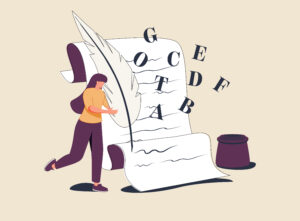
If the letters actually made words, I’d be all set!
We’ve all been taunted by the blinking cursor. It mocks us from the blank page, its incessant repetition a ruthless reminder of our inability to put thoughts into words.
Whether you’re writing contracts, pleadings, legal briefs, or creative essays, a basic draft that captures the essence of your ideas is the only thing that can repudiate the dreaded blank page curse.
You just need a starting point. And that is precisely what generative AI offers.
When prompting a generative AI tool to produce a first draft, you can let ideas flow without judgment. The tool assists in creating an initial draft which you build up and hone into a masterpiece.
Let’s look at the benefits and challenges of using trained AI models to instantly generate contextually appropriate legal documents. You’ll see how using this technology can save you countless hours of work.
Use AI To Generate A Helpful First Draft Of Legal Documents
While you’ve been juggling multiple matters, researching legal issues, and meeting tight deadlines, generative AI has emerged as a powerful ally. Custom AI models have been trained on vast amounts of legal text and documents, using techniques like natural language processing and deep learning to duplicate legal language patterns, structures, and terminology.
With just a few prompts, you can generate a first draft that captures the core elements of the legal document you need. The draft adheres to consistent language, style, and formatting conventions, reducing opportunities for errors and omissions. You can also base AI-generated documents on predefined templates and standardized clauses, helping ensure contracts and agreements use the most up-to-date language.
Simply tell the AI tool what type of contract you need, and it generates it for you. Rather than wasting hours staring at a blank page or searching through unsuitable examples to copy and paste, you’re ready to refine your draft into a final document.
Generative AI speeds up draft review and revision, too. Simply prompt the tool to include relevant details, clauses, and provisions and ask it to suggest commonly used clauses that meet your client’s specific needs and situation. Following your prompts, AI can unearth legal aspects you may have overlooked otherwise.
Overcome Challenges Of Generating Legal Documents With AI
By using generative AI to generate legal documents, you provide personalized legal services efficiently and affordably. But as with most good things, a few challenges exist. These include:
Ensure High-Quality And Diverse Training Data
An AI model trained on a single data set has a narrow view. However, concerns around data privacy, security, and IP rights can make it challenging to access large, comprehensive legal text datasets.
Industry stakeholders are working to overcome this hurdle, encouraging the creation of open legal data sets, developing data-sharing protocols, and creating new ways to access existing data. Vendors are also developing generative AI tools with publicly available legal data.
Reveal The Mystery Of AI Black Boxes
Trust and transparency are critical in legal work. But AI “black boxes” make understanding the reasoning behind a model’s generated output difficult. Interdisciplinary teams with legal, technical, and ethical experts can help mitigate biases and ensure greater transparency. AI models must be designed with interpretability in mind.
Understand Legal Language Nuances
Legal documents often contain intricate nuances, specialized terminologies, and context-specific requirements. Over time, continuous fine-tuning and input from legal professionals helps AI models increase their precision and expertise to better comprehend and generate legal language accurately.
Manage Liability Risks
Any generative AI tool and its data must comply with established rules and stay current with regulatory changes. Implementing rigorous compliance checks and audits can help mitigate risks associated with potential breaches or inadequacies. After all, lawyers retain full responsibility for final documents.
You still must ensure final documents are accurate and meet client needs. The difference now is how quickly and easily you get to the final version. Rather than anxiously contemplating every word before it hits the page, feeling your confidence wane with each cursor blink, AI liberates your creative freedom. AI offers speed, accuracy, and quality in an efficient and elegant process. Are you ready to turn the blank page from your foe into a canvas awaiting your brilliance?
 Olga V. Mack is the VP at LexisNexis and CEO of Parley Pro, a next-generation contract management company that has pioneered online negotiation technology. Olga embraces legal innovation and had dedicated her career to improving and shaping the future of law. She is convinced that the legal profession will emerge even stronger, more resilient, and more inclusive than before by embracing technology. Olga is also an award-winning general counsel, operations professional, startup advisor, public speaker, adjunct professor, and entrepreneur. She founded the Women Serve on Boards movement that advocates for women to participate on corporate boards of Fortune 500 companies. She authored Get on Board: Earning Your Ticket to a Corporate Board Seat, Fundamentals of Smart Contract Security, and Blockchain Value: Transforming Business Models, Society, and Communities. She is working on Visual IQ for Lawyers, her next book (ABA 2023). You can follow Olga on Twitter @olgavmack.
Olga V. Mack is the VP at LexisNexis and CEO of Parley Pro, a next-generation contract management company that has pioneered online negotiation technology. Olga embraces legal innovation and had dedicated her career to improving and shaping the future of law. She is convinced that the legal profession will emerge even stronger, more resilient, and more inclusive than before by embracing technology. Olga is also an award-winning general counsel, operations professional, startup advisor, public speaker, adjunct professor, and entrepreneur. She founded the Women Serve on Boards movement that advocates for women to participate on corporate boards of Fortune 500 companies. She authored Get on Board: Earning Your Ticket to a Corporate Board Seat, Fundamentals of Smart Contract Security, and Blockchain Value: Transforming Business Models, Society, and Communities. She is working on Visual IQ for Lawyers, her next book (ABA 2023). You can follow Olga on Twitter @olgavmack.